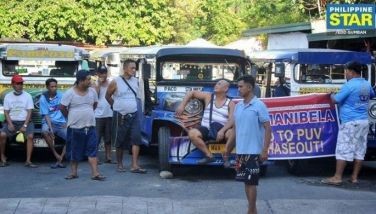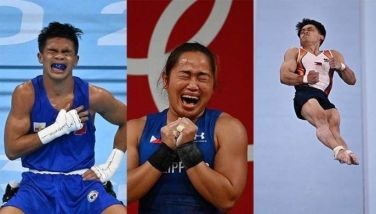Paris concernedwhy P-Noy has not reactivated UNESCO
(Part II of a series on 25 Years of Non-Political UNESCO projects for the Philippines and Asia)
Since he was elected last May, President Benigno C. Aquino III has not activated the UNESCO National Commission. Even before election, a complete list of experts has been carefully studied by Committee Chairmen Dr. Florangel Braid (Communication), Felice Sta Maria (Social and Human Science), DepEd Usec. Labrador with CHED director Dr. Nona Ricafort (Education), Carmen Padilla (Culture) and Mel Velarde (Science & Technology) to replace 27 commissioners whose terms have ended in the Education, Science and Technology, Social & Human Science, Culture Committees and Marine Science sub-committee have been recommended to Malacanang through DFA Secretary Alberto Romulo, UNESCO NatCom Chairman.
The Philippine UNESCO charter also specifies the inclusion of 12 Cabinet secretaries, five special choices of the president and two ex-officio members of the Education committees of the Senate and Congress.
Only 4 years left to meet the UNMDG 2015
At least President Aquino approved the highly respectable sociologist Dr. Virginia Miralao, whom I recommended, to replace me as UNESCO Secretary General. She is very well known in the international circles and was our former UNESCO SHS Commissioner.
So far, only five government officials were appointed; DepEd Secretary Armin Luistro, CHED Secretary Patricia Licuanan, TESDA Secretary Joel Villanueva and the two ex-officio chair of the Education committees Sen. Edgardo Angara and Rep. Salvador Escudero.
The UNESCO Secretariat is helpless and unable to continue approximately 60 projects to help the UN Country team achieve the UNMDG particularly the projects to reverse two failures of the Philippines: achieving quality primary education and increasing maternal and infant health. The extremely high rates of school repeaters yearly, add to the increase of adult illiterates in the Philippines, thus perpetually crippling the economy. It’s puzzling why only 10 percent-12 percent of college graduates who take the civil service exams, pass.
A huge blunder in international diplomacy for the Philippines
UNESCO Director General Irina Bokova is honoring the Philippines with her visit this coming March. Our UNESCO office has always been involved in this, but not this time. Weeks before DG Matsuura came, his achievements and the vital undertakings and his support in our country were front page stories. DG Irina Bokova also deserves President Aquino’s invitation to lunch in Malacanang together with her delegation and our UNESCO commissioners.
The General Conference is due in Paris this October to confirm project proposals of 192 member states, including the Philippines. These were supposed to have been presented earlier in both the spring and autumn sessions of the Executive Board. Our opportunity was greatly weakened when President Aquino suddenly nullified government appointments, preventing me to report the progress of the newly approved Philippine Category 2 Southeast Asian Center for Lifelong Learning for Sustainable Development, the first one of its kind among the UNESCO member states. We also lost the chance to promote an average of 60 projects we worked together for each biennium program with our commissioners. A pity, since our Ambassador to Paris, Madame Rora Tolentino had been elected chair of the ASEAN cluster countries. She will retire this year.
UNESCO has honored us for each Biennium program 10 to 12 intersectoral projects costing each $20,000 to $35,000. Without the commissioners, who will continue transforming Basic Education for Sustainable Development? DESD or the Decade of Education Sustainable Development is already ending by 2014.
Between 2005 to 2009 until his last year of governance, UNESCO Director General Matsuura had faithfully shepherded the Philippines to acquire the Category 2 status to be the Southeast Asian Center for Lifelong Learning for Sustainable Development (SEA-CLLSD). The new DG Irina Bokova during her campaign here in Manila and after her 2009 election, told me personally she would give it full support. She was happy that we succeeded in gaining back the much coveted seat in the 176th Executive Board 2009, the same year the Philippines became the SEA-CLLSD.
Encouraging all category 2 centers to serve and collaborate with Asia Pacific member states
Every four years, UNESCO would hold the Quadrennial Conference in each cluster of member states together with the DG’s Consultation. The Philippines received this honor in 2008 hosting the Paris UNESCO Secretariat together with the 150 delegates of 45 ASPAC member states of the Asia Pacific cluster. Dame Sylvia Cartwright of New Zealand, the former quadrennial host, opened the grand ceremony with me at the EDSA Shangri-La Hotel.
The whole assembly together with the UNESCO Paris and regional office directors felt that our lead speaker, former President Gloria M. Arroyo expressed well the theme of “working together, we can combine efforts and resources toward the building of peace, the eradication of poverty, sustainable development and intercultural dialogue through education, sciences, culture and communication.”
The final recommendation stressed three items out of six, focused on the importance of the DESD; first, that there should be close working relationships between national commissions and UNESCO Category 2 Institutes and Centers; second, ensure monitoring and evaluation of programs and outcomes; third, encourage category 2 centers to serve and collaborate with all member states of the Asia Pacific Region.
Bangkok UNESCO regional director expresses concern over SEA-CLLSD
Right after President Aquino was elected, he abrogated and made void government appointees of the previous administration with Executive Order No. 1. This triggered alarm from the UNESCO Regional Director Guang-Jo Kim, who was specially assigned by former DG Matsuura to support the fledgling CLLSD. He personally expressed concern to me what would happen to the services promised to the 10 ASEAN. That was in New Delhi, where the Indian Natcom invited me to speak about our Center since Paris headquarters just approved their Category 1 Institute of Mahatma Gandhi for Peace and Sustainable Development. Naturally I was speechless and felt very embarrassed.
Meantime, CLLSD Director, Dr. Nita Guerrero ably assisted by CLLSD consultant Ambassador Hector Villaroel, our former ambassador to Paris and UNESCO, had finalized the 2010-2015 CLLSD Plan, and had communicated this to the Bangkok Regional office. This is supposed to be activated as soon as the CLLSD governing board has been organized. In fact, DG Irina Bokoba had confirmed Director Kim to head this board.
UNESCO NATCOM to help P-Noy project an honorable and humanitarian image to the world
Mr. President, we need the continued support of your new administration to sustain these efforts. Our ASEAN neighbors have looked up to us, and have collaborated generously. We need not be disgraced and humiliated.
It’s never too late to remedy the situation. By this, you affirm your commitment to the welfare of the Filipinos as well as our neighbors.
(Next week: An Inventory of UNESCO Projects in the Philippines)
- Latest


























 Partner
Partner



